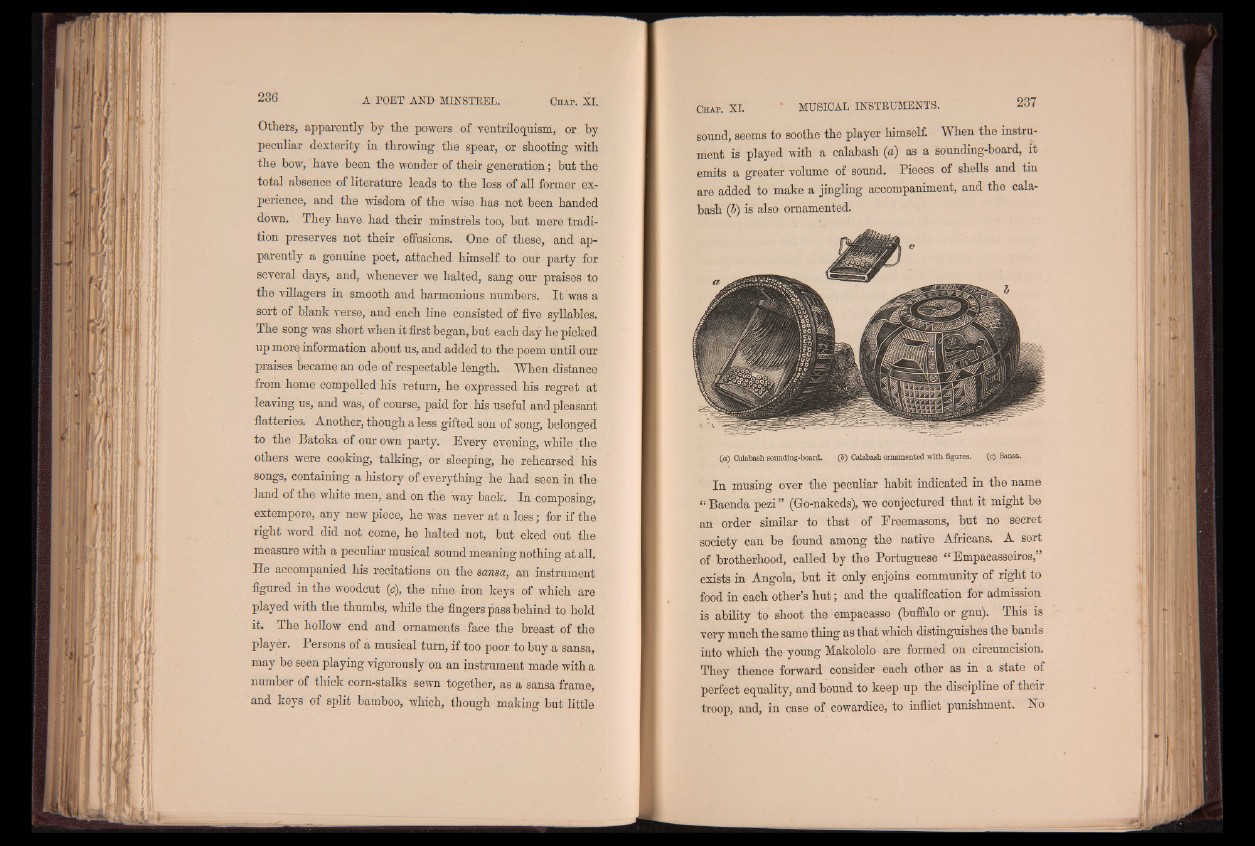
Others, apparently by the powers of ventriloquism, or by
peculiar dexterity in throwing the spear, or shooting with
the bow, have been the wonder of their generation; but the
total absence of literature leads to the loss of all former experience,
and the wisdom of the wise has not been handed
down. They have had their minstrels too, but mere tradition
preserves not their effusions. One of these, and apparently
a genuine poet, attached himself to our party for
several days, and, whenever we halted, sang our praises to
the villagers in smooth and harmonious numbers. I t was a
sort of blank verse, and each line consisted of five syllables.
The song was short when it first began, but each day he picked
up more information about us, and added to the poem until our
praises became an ode of respectable length. When distance
from home compelled his return, he expressed his regret at
leaving us, and was, of course, paid for his useful and pleasant
flatteries. Another, though a less gifted son of song, belonged
to the Batoka of our own party. Every evening, while the
others were cooking, talking, or sleeping, he rehearsed his
songs, containing a history of everything he had seen in the
land of the white men, and on the way back. In composing,
extempore, any new piece, he was never at a loss; for if the
right word did not come, he halted not, but eked out the
measure with a peculiar musical sound meaning nothing at all.
He accompanied his recitations on the sansa, an instrument
figured in the woodcut (e), the nine iron keys of which are
played with the thumbs, while the fingers pass behind to hold
it. The hollow end and ornaments face the breast of the
player. Persons of a musical turn, if too poor to buy a sansa,
may be seen playing vigorously on an instrument made with a
number of thick corn-stalks sewn together, as a sansa frame,
and keys of split bamboo, which, though making but little
sound, seems to soothe the player himself. When the instrument
is played with a calabash (a) as a sounding-board, it
emits a greater volume of sound. Pieces of shells and tin
are added to make a jingling accompaniment, and the calabash
(5) is also ornamented.
(6) Calabash (a) Calabash sounding-board. ornamented with figures. (c) Sansa.
In m u s in g over the peculiar habit indicated in the name
“ Baenda pezi” (Go-nakeds), we conjectured that it might be
an order sirm'Ur to that of Freemasons, but no secret
society can be found among the native Africans. A sort
of brotherhood, called by the Portuguese “ Empaeasseiros,”
exists in Angola, but it only enjoins community of right to
food in each other’s h u t; and the qualification for admission
is ability to shoot the empacasso (buffalo or gnu). This is
very much the same th in g as that which distinguishes the bands
into which the young Makololo are formed on circumcision.
They thence forward consider each other as in a state of
perfect equality, and bound to keep up the discipline of their
troop, and, in case of cowardice, to inflict punishment. No